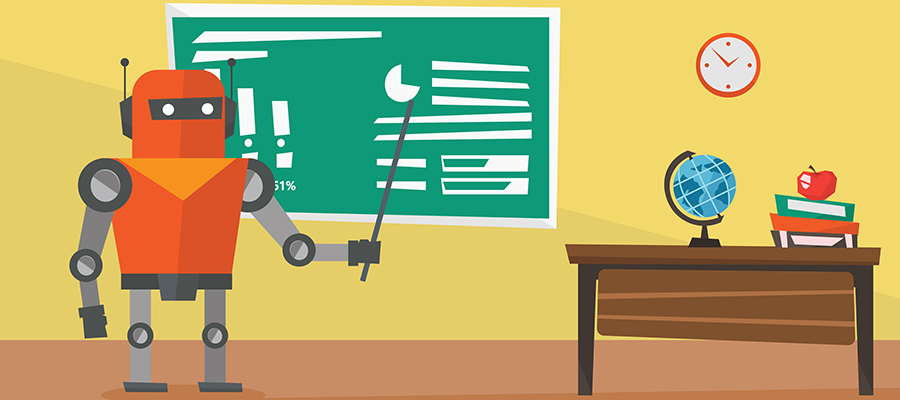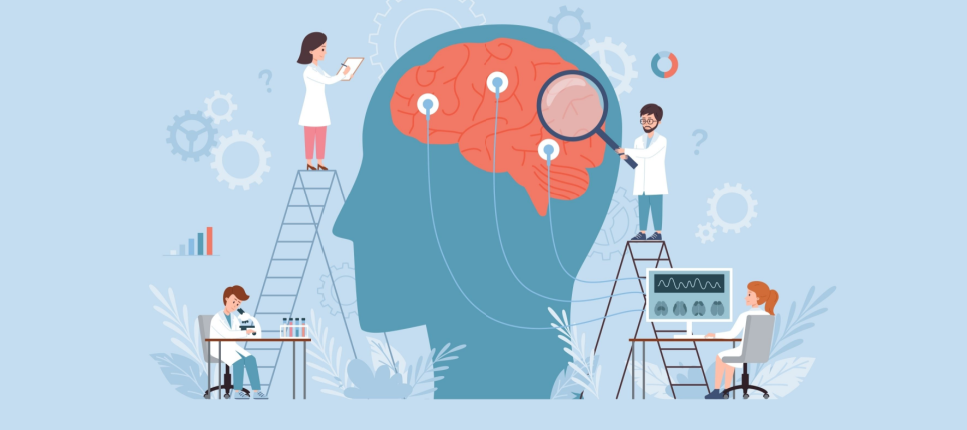Until recently, the teacher and the school held the “monopoly” of disseminating knowledge. That was before the revolution of the social Web (2.0) and information technologies. Our world is changing faster and deeper than ever. In the midst of this whirlwind, we cannot avoid a re-evaluation our common values, but also the identity and role of our institutions. Among them is “the school” which, from elementary to university, has given body and direction to our society for generations.
What turn must it take to prepare citizens and workers for a future world that might look very different from the one we know right now? Without spending time on science fiction, here are 4 challenges that our education system must tackle now.
1. Diving into the unknown
A new world is emerging. Even though it will certainly be “hyper technologized,” we do not know what it will look like. In his lecture “Dwarves on the shoulders of giants: artificial intelligence and the rebirth of education,” Québec writer and essayist Ollivier Dyens argues that we have not yet seen the whole picture. “Do you think you’re already in the world of technology? Think again, […] the technological revolution has not even begun. Today we see technologies that will completely change our lives, our society and the way we do education.” Dyens calls the “human-machine ecosystem” a new world that will emerge from technologies such as artificial intelligence (AI), big data, the Internet of Things and the 3D printer; a world in which “normal” and virtual reality will become entangled.
There is enough to feel certain dizziness, considering that these technologies exist today and that others, even more sophisticated, can emerge at any time. Even the players who are at the forefront of this technological revolution avoid getting into predictions. “It is difficult to describe this change because there is still so much to come,” said Montreal researcher Joshua Bengio, who is among the world’s leading artificial intelligence (AI) experts. “The future will be very different from what we can currently imagine. The effect, presumably, will be important not only on society but on who we are as human beings,” he adds.
Bengio’s point of view overlaps with that of the majority of observers of the phenomenon. In his latest book 21 Lessons for the 21st Century, Israeli historian and professor Yuval Noah Harari, to whom we owe the bestseller Sapiens: A Brief History of Humankind, also speaks of a redefinition of human and humanity. It is because unlike the last great revolution – the industrial one – the digital revolution carries with it not only social-economic changes but also physical and cognitive changes.
Without trying to act as a foreteller either, Harari nevertheless believes that the unknown will become a constant variable with which we will have to learn to cope. To the unknown, the “discontinuity” will probably be added, since unlike the linear structure that has so far defined human existence – we learn during the first part of our lives, then we work – everyone will constantly have to reinvent themselves. And if the historian is convinced of one thing, it is that what young people are learning today will be completely obsolete by 2050; a generally-agreed opinion.
“Reading, writing, counting were the necessary and sufficient tools to take advantage of the developments of the industrial revolution. But they are no longer sufficient in the 21st century, and that’s because it is no longer possible to say that what you learn today will serve for your entire life,” said in an interview, Andreas Schleicher, OECD Director of Education. “At the time of the digital revolution, we must give a compass to each, to make them able to build their knowledge, able to distinguish the true from the false when they navigate on Google. It’s as important as learning to count and read. ”
We do not know what society will look like in 2050. Nevertheless, it is necessary to try to prepare for it, to plunge into the unknown. “We need to think about an education system that prepares young people for this level of uncertainty. […] By making them able to think for themselves, to learn for themselves, to be able to adapt to transformations,” explains Joshua Bengio.
2. Embracing the world of technology
In such a context, it is impossible to linger in the belief that to survive, the education system and its institutions will be able to settle for minor adjustments similar to those that have been used up until now. Multiple voices are expressing urgency to address this issue and take action. We can also look into UNESCO’s report on Education and the Role of Teachers in 2020 which states that “obviously, school is no longer a privileged vector for the transmission of knowledge.” The report also explains that “the transformation of the school system is undoubtedly its condition for survival […].”
As Ollivier Dyens eloquently points out: “It is no longer possible to experience the world without technology. We love, we hate, we vote, we enrich ourselves with technology. It is imperative, he says, to recognize that we are now evolving within a “human-machine ecosystem” and to make it ours. In an interview, Dyens told us that what is important is to interweave technologies to education, not just to use them as tools, as we do now: “We must ponder about the world through technology, to think differently. The key is to introduce artificial intelligence into educational systems, even to use it as a basis for solving ethical problems related to technologies, such as personal data issues.”
Noting that the education system, which is not very flexible, is more often reactive than proactive, Dyens insists on the need to “seize this world of technology,” “not to push it back.” In the same time, we have to consider the risks of letting Google, Apple, Facebook, and Co. create educational models, and the risks of having the ethical and human values that matter to us slowly slip under our feet. “Yes Google and Co. can offer training, but they are private companies, and they must generate revenue; this is not the case of the educational system, it does not cross this line.” Regarding the things that we should preserve from the current system Dyens points out that “what is fundamental, what must be kept are the values, the psychological and intellectual maturity of the school, not the institutions,” adding that in this regard, the government focuses on the bad objectives.
Currently, when we talk about the influx of technologies in the world of education, we spontaneously think of “virtual” or online learning, particularly at the university level – some people talk even about “virtual universities.” The recent rise of massive open online courses (MOOCs) marked a turning point, with some of the largest universities in the world launching several lately.
The progress in virtual reality and gamification technologies used as learning tools also point to impressive opportunities to come in the next years. Faced with these innovations, however, we must begin the difficult reflection on the redefinition of the role and identity of the entire structure of education, starting with those of the teacher. As Hélène Papadoudi-Ros points out “[…] any attempt at innovation in the education system raises the question of the role of the teacher and his functions because the essential factor of the educational enterprise is ultimately the educator.”
3. Finding new benchmarks
“Nothing is permanent except change.” Since the Greek philosopher Heraclitus of Ephesus, who lived six centuries before our era, many thinkers have each in their own way noted this inevitable evidence, and urged their contemporaries to approach it with wisdom: by accepting it and adapting to it. Nevertheless, the present time requires us to dig deeper into our pool of wisdom, since our technological progress has made this impermanence evolve in an accelerated mode. The changes specific to our time are particularly likely to jeopardize our traditional benchmarks. While wisdom has long dictated us to rely on the experience of previous generations, common sense, now, encourages us to move opposite to this millennial reflex. It is because many of the models that we know and have succeeded are no longer in line with the new paradigms of the technological revolution.
To return to the world of education, think only of the lecture and the long hours in class that still structure student life, as was the case 50 years ago, while we are “thirstier” for autonomy and flexibility. And what about the calendar divided into semesters based on the agricultural imperatives of yesteryear… As advised by Ollivier Dyens, there is an urgent need to bridge the widening gap between the adoption of technologies in society in general and that in the educational system. However, we must do more than catch up. The stable and immutable character of this system and its institutions – which has already shown its strengths – is now a brake on their adaptation to the modern world. Let us not forget that the school must not only adapt to society; it must question it, guide it, inspire it.
In an interview about the possible disappearance of standard universities to the benefit of online education, Gilles Babinet, France’s Digital Champion at the European Commission, expressed why he believes the system of education should be seriously rethought. “I have the impression that we are entering a very different society from that of the 20th century, where […] education was organized for the sake of production and nothing else. The school has been “tailor-made”; was kind of a mirror of the production lines. Students were placed in classrooms and given grades that allowed them to be inserted according to their skills in the production line, at different levels. This system does not work anymore.” Babinet also believes that in the future, degrees will have a relative value compared to what we currently see.
The most daring, the most visionary or the most worried – that remains to be seen – definitely recommend turning away from the model of the school we know to reinvent it by appealing to our creativity. And the big challenge would be there. To dare to rethink the school, at all its educational levels, by projecting itself 50 years ahead, by taking inspiration from structures that, at first sight, may have no connection with it… For example, Dyens refers to the anthill, a structure that works without direction, or the human body – and these are just some of his original suggestions. Gilles Babinet wonders whether, in parallel with the possible virtualization of the university, it would not be wise for every city in the world to have cafes, for example, where students and teachers could exchange in person.
4. Betting on the human
To live well in this new “human-machine ecosystem,” it will be necessary to delegate to the machine the tasks in which it surpasses us and to bet on our strictly human advantages. The movement is already underway, as AI has begun to automate repetitive or hyper-complex cognitive tasks. In the same time, skills such as interpersonal, artistic talents, emotional intelligence or critical thinking are becoming more popular on the job market (see Top 10 skills searched in 2020 and Will a robot replace your job?).
As access to information has become democratized, the school and the teacher are no longer the privileged guardians of knowledge. However, their role as a guide to help the learner navigate this sea of information becomes crucial. In parallel, since the worker of tomorrow will have to be able to reinvent himself, it becomes essential for him to “learn how to learn.” According to Dyens, we have to accept that technologies will be better teachers than us – in the sense that they will have access to more information, be more “patient,” available at all times and able to adapt what they do to the learner. On the other hand, we believe that we can become better coaches, better mentors, better consultants than machines: “Our added value is human contact.” In addition, the integration of technologies in the school system does not necessarily go against the promotion of human contact, on the contrary: “Is a class of 700 students taking a course in biology, for example, and who do not say a word, a proof of the added value of human contact?” By leaving to technology the share that it can take care of, in the transmission of knowledge, the professor could thus devote himself to the most human dimension of education.
In the same line of thoughts, if individualism has marked the last decades, many believe that we are returning to collaboration. “I think we are entering a society where knowing how to learn is more important than knowing. And, beyond that, the notion of collaboration is fundamental. For example, when you come from the world that I come from – that of start-ups – multidisciplinarity is fundamental and collaborating is an important element of success. It is found in many disciplines, especially in the fundamental sciences, where we can find several. There are no more scientists who discover on their own,” explains Gilles Babinet. The technological revolution is not foreign to the strengthening of the collaborative spirit. In Osons l’école, Sainte-Anne’s College President and CEO, Ugo Cavenaghi, reminds us that “technologies also make us connected individuals” and that platforms that allow us to create and share content “invite the educational community to make the transition from a very individualistic culture to a culture where collaboration prevails.”
Combining our strengths with those of technology can also foster our collaborative nature. In this regard, Mr. Dyens gives as an example the consequences of the victory of the supercomputer Deep Blue over the then-chess-champion Garry Kasparov. While many people have seen the end of this discipline, this event has rather brought forward the human skills of players.
“There are now chess competitions where teams of human beings pair with software and compete with each other. What is very interesting is that the teams that win are not necessarily the teams that have the best chess players, but the teams that work best between them, who have the best attitude and the best team spirit. […] What is happening? It’s because these teams use all the knowledge of machines. They use the things that machines give us access to […]. These teams use that and add fundamentally human structures, as strategy, bluffing, creativity, the unexpected … and that’s where we have to go.”
***
Towards a humanist revolution?
As is the case today, the mission of the school, from elementary to university, will undoubtedly remain for the next 50 years to continue to develop well-rounded individuals, able to find their place in society and to make their full contribution. In the wake of the digital revolution, however, the means to achieve this must change. For the benefit of the citizens and workers of tomorrow and the very survival of the school, all the players in the education system will have to face significant challenges, including those of plunging into the unknown, embracing the world of technologies, finding new benchmarks and betting on the human. As destabilizing as the perspective of the world emerging before our eyes is, we have every interest in trying to prepare for it, at least to give it direction. And, who knows, this digital revolution will perhaps become the greatest humanist revolution in history.
A measure of the times
Together with the technological revolution, we are experiencing, an unprecedented chapter of human history opens up. Did you know that…
- For the first time, knowledge is renewed faster than generations.
- Today, we can consume, in a single day, the amount of information that people living in the Middle Ages had consumed during a lifetime.
- The disruptions brought on by new technologies are a global phenomenon; they concern the whole of humanity.
- Unlike the industrial revolution, the digital revolution brings not only socio-economic but also physical and cognitive changes – with artificial intelligence (AI) and transhumanism, for example, that will challenge our human nature.






